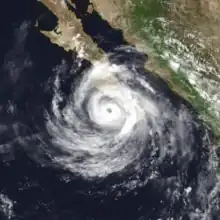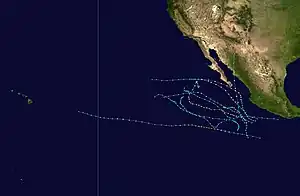 Hurricane Henriette at peak intensity near the Baja California Peninsula on September 4 | |
| Meteorological history | |
|---|---|
| Formed | September 1, 1995 |
| Remnant low | September 8, 1995 |
| Dissipated | September 9, 1995 |
| Category 2 hurricane | |
| 1-minute sustained (SSHWS/NWS) | |
| Highest winds | 100 mph (155 km/h) |
| Lowest pressure | 970 mbar (hPa); 28.64 inHg |
| Overall effects | |
| Fatalities | None reported |
| Damage | Minimal |
| Areas affected | Northwestern Mexico, Baja California Peninsula |
| IBTrACS | |
Part of the 1995 Pacific hurricane season | |
Hurricane Henriette was the ninth tropical cyclone, eight named storm and fifth hurricane of the 1995 Pacific hurricane season. Henriette developed from a tropical wave that emerged from the west coast of Africa on August 15. After crossing the Atlantic and moving into the eastern Pacific on August 29, it developed a low-level circulation that was designated a tropical depression on September 1. The next day, the depression was upgraded to Tropical Storm Henriette, and it was further upgraded to a hurricane on September 3. The storm peaked as a Category 2 hurricane on the Saffir-Simpson Hurricane Scale, and crossed the southern tip of Baja California Peninsula. On land, wind gusts of 100 mph (160 km/h) were reported, knocking out power and water supplies. Heavy rainfall and strong storm surge contributed to flooding that damaged many roads; throughout the region, 800 people were forced from their homes.
Meteorological history

Tropical storm (39–73 mph, 63–118 km/h)
Category 1 (74–95 mph, 119–153 km/h)
Category 2 (96–110 mph, 154–177 km/h)
Category 3 (111–129 mph, 178–208 km/h)
Category 4 (130–156 mph, 209–251 km/h)
Category 5 (≥157 mph, ≥252 km/h)
Unknown
A tropical wave moved off the coast of Africa on August 15. It traversed westward and entered the eastern Pacific Ocean on August 29. The system quickly developed deep convection and a low-level circulation, and on September 1 it organized into Tropical Depression Nine-E while located about 170 miles (270 km) off the southwest coast of Mexico. The depression initially moved west-northwestward, and shortly after forming it turned to the north-northwest. Under favorable conditions, the depression slowly strengthened to become Tropical Storm Henriette on September 2 while located 220 miles (350 km) west of Manzanillo.[1] By later that day, the convection wrapped around the center of circulation.[2] Henriette quickly organized and intensified into a hurricane on September 3 while located 135 miles (217 km) west-southwest of Puerto Vallarta in Jalisco.[1] Upon reaching hurricane status, one computer model predicted Henriette to continue moving northward through the Gulf of California, though most forecast a turn to the northwest.[3]

Late on September 3, an eye began to form in the center of the deep convection as Henriette turned to the northwest.[4] The eye became better defined the next day, and Henriette attained a peak intensity of 100 mph (160 km/h) as the northern portion of the eyewall moved over southern Baja California Peninsula. The hurricane quickly crossed the southern tip of Baja California Peninsula and emerged into the Pacific Ocean again as a weakened 85 mph (137 km/h) cyclone with disrupted convection near the center.[5] Convection gradually waned as the hurricane moved over progressively colder waters,[6] and on September 6 Henriette weakened to a tropical depression. The storm turned to the west, and gradually weakened until dissipating on September 8.[1]
Preparations and impact

On September 2, a few hours after Henriette became a tropical storm, the government of Mexico issued a tropical storm watch for Baja California Peninsula from La Paz southward. Early the next day it was changed to a hurricane watch, and 18 hours before Henriette made landfall the watch was upgraded to a hurricane warning. Early on September 4, the hurricane warning was extended northward to 25°N.[1] The threat of Hurricane Henriette prompted a Carnival Cruise Line ship to alter their route. Originally planned to tour Mexican ports, the captain turned the ship to tour the southern California coastline. Many upset passengers demanded refunds, to which the cruise line offered discounts for future cruises and a $40 credit card during their cruise.[7]
Winds of up to 100 mph (160 km/h) in southern Baja California Sur left much of Cabo San Lucas without water or power.[8] Overall, 2,000 people were directly affected by the hurricane.[9] A strong storm surge produced flooding and heavy road damage in the state. Approximately 800 people were forced from their homes, and crop damage was reported. Generally up to 10 inches (250 mm) of rain fell on land, though peak precipitation exceeded 13 inches (330 mm). No damage estimates are available, and no deaths were reported.[1][10]
See also
References
- 1 2 3 4 5 Miles Lawrence (1995-11-28). "Hurricane Henriette Tropical Cyclone Report". National Hurricane Center. National Oceanic and Atmospheric Administration. Archived from the original on 2006-06-21. Retrieved 2006-11-20.
- ↑ James M. Gross (1995-09-02). "Tropical Storm Henriette Discussion Four". National Hurricane Center. National Oceanic and Atmospheric Administration. Retrieved 2006-11-20.
- ↑ Jerry D. Jarrell (1995-09-03). "Hurricane Henriette Discussion Seven". National Hurricane Center. National Oceanic and Atmospheric Administration. Retrieved 2006-11-20.
- ↑ James M. Gross (1995-09-03). "Hurricane Henriette Discussion Nine". National Hurricane Center. National Oceanic and Atmospheric Administration. Retrieved 2006-11-20.
- ↑ James M. Gross (1995-09-04). "Hurricane Henriette Discussion Thirteen". National Hurricane Center. National Oceanic and Atmospheric Administration. Retrieved 2006-11-20.
- ↑ Richard J. Pasch (1995-09-05). "Hurricane Henriette Discussion Fifteen". National Hurricane Center. National Oceanic and Atmospheric Administration. Retrieved 2006-11-20.
- ↑ Staff Writer (1995-09-12). "A Raucous Ending to a Cruise". New York Times. Retrieved 2006-11-20.
- ↑ Staff Writer (1995). "Orem, USA — La Paz, Mexico — Orem, USA: May 1995 – September 1995". Daydream. Retrieved 2006-11-20.
- ↑ Staff Writer (2001-09-21). "Desastres Ocurridos en México de 1980 a 1999" (PDF). Programa Nacional de Reforestación. Archived from the original (PDF) on 2012-02-04. Retrieved 2006-11-20.
- ↑ David Roth (2009-02-15). "Hurricane Henriette — September 1–7, 1995". Hydrometeorological Prediction Center. Retrieved 2009-02-15.
